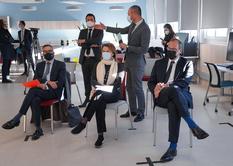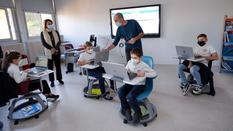- Homepage
- A Modern State
- News
- Monegasque education in the digital era
Monegasque education in the digital era
As part of Computer Science Week, Christophe Prat, Director-General of the Ministry of the Interior – representing Patrice Cellario, Minister of the Interior – Frédéric Genta, Country Chief Digital Officer, and Isabelle Bonnal, Commissioner General for the Department of Education, Youth and Sport, attended a digital Life and Earth Sciences class, as well as a coding lesson with primary school pupils at the Collège Charles III EduLab.
They also offered an initial update on changing practices in the Monegasque education system in the digital era, and to sketch out the future of education in the Principality in order to offer all children educated in the country the best possible opportunities.
Driven by the Extended Monaco programme, concrete actions have been put in place over the last three years:
- Roll-out of coding classes from primary school upwards and signature of a partnership with the American institution code.org;
- Opening of an EduLab at Collège Charles III, a 200 m2 space dedicated to new teaching practices;
- Development of teaching practices through the distribution of personal digital devices to teachers and pupils.
“The quality of the Monegasque education system is a priority for the Government. In this era of digital transformation, we have a duty to prepare the next generations for the challenges of tomorrow’s world, and to help them to understand new technology so that they can maintain control over it,” emphasises Christophe Prat.
Using digital to enhance education
According to a study carried out by Dell and the Institute for the Future in 2017, 85% of the jobs that will be available in 2030 have not yet been invented. This highlights the range of opportunities that digital technology offers from a very young age, and the importance of rolling this programme out at the national level in Monaco.
Through the Digital Secondary School (Collège) project, since the beginning of the new academic year in 2020, all pupils have been given a touchscreen laptop loaded with all of their digital textbooks and software to facilitate teaching. According to the same principle, pupils at Lycée Albert I entered the digital era after the autumn break.
It is not just about handing out equipment. The aim is to transform the learning experience using the latest in technology: studying the solar system in 3D, designing and visualising a bacterium on a computer, taking self-marking online quizzes, etc.
Using digital to support inclusive education
Digital technology has also demonstrated its ability to build stronger, smoother relationships between teachers, pupils and parents. The various IT tools used in secondary schools are real levers for promoting inclusion, with solutions that facilitate learning continuity and the ability to monitor pupils remotely during an extended absence (a telepresence robot), supplement careers guidance (the Caeso app provides a virtual coach) or support learning (Parkours personalised courses).
“Children and parents today expect the same services in education that they are used to in their everyday lives: being able to check marks, homework and timetable changes online, speak remotely to teachers, and carry out procedures online. Using digital technology, we can offer an effective response to pupils’ educational needs and better personalise learning pathways,” says Isabelle Bonnal.
Using digital to prepare the future for the new generation
Training has also been placed at the heart of this revolution. All secondary school pupils receive six hours of digital literacy training. Teaching teams also receive expert support to help them make best use of these tools to enable their pupils to succeed.
Thanks to EduLab, teachers have access to innovative tools such as virtual reality headsets, touchscreens, educational robots and 3D printers. Digital technology also promotes parental involvement, thanks, among other things, to the introduction of special webinars and virtual guides.
“The education system must be able to meet the challenges posed by the working world of the future. To develop a strong and attractive economy in the years to come, we need well-trained, outward-looking young people who are familiar with new technology,” notes Frédéric Genta.
Simplifying administrative procedures for parents
Moving a number of procedures – such as enrolment in secondary school or for an adapted timetable, or paying for school meals – online is helping to streamline contact with parents.
All of these procedures are available via the new Public Service MonGuichet.mc portal, which parents can log into using their Online Services Account or MConnect. All procedures relating to the school system will be moved online by the end of 2022.
What’s next?
Following on from Collège Charles III and Lycée Albert I, students at Monaco’s Vocational and Catering School will receive personal computers next year. In 2022, training provision for pupils will also be expanded, with more hours taught and the adoption of a whole-of-society approach to help them better understand their future in a resolutely digital world.
Primary schools will experiment with new practices, thanks to immersive experiences in the classroom, reorganised spaces and time dedicated to learning about digital technology.
For teachers, an educational content platform is being studied to help enrich their classes through a varied catalogue of royalty-free content (pictures, interactive maps, videos, etc.).
Autres actualités du thème

PropTech Conference: impacts and challenges in Monaco and around the world

The Minister of State receives the Chairperson of the Council on the Status of Women for International Women’s Day

From 5 March, a mobile network will be available to everyone in the Principality
- The Extended Monaco digital programme
- Modernising the Administration
- Digital Security: a challenge for the future
- Assessment of public policies
- Protection of personal data
- The Administration's eco-responsibility
- The duty of remembrance
- Public finance – meeting challenges more effectively
- The Public Service
- Monaco's image









